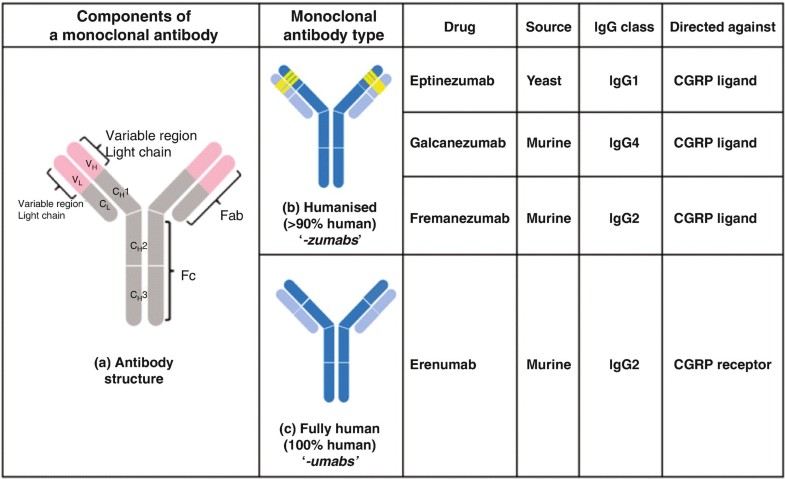
Eptinezumab
エプチネズマブ;
(Heavy chain)
EVQLVESGGG LVQPGGSLRL SCAVSGIDLS GYYMNWVRQA PGKGLEWVGV IGINGATYYA
SWAKGRFTIS RDNSKTTVYL QMNSLRAEDT AVYFCARGDI WGQGTLVTVS SASTKGPSVF
PLAPSSKSTS GGTAALGCLV KDYFPEPVTV SWNSGALTSG VHTFPAVLQS SGLYSLSSVV
TVPSSSLGTQ TYICNVNHKP SNTKVDARVE PKSCDKTHTC PPCPAPELLG GPSVFLFPPK
PKDTLMISRT PEVTCVVVDV SHEDPEVKFN WYVDGVEVHN AKTKPREEQY ASTYRVVSVL
TVLHQDWLNG KEYKCKVSNK ALPAPIEKTI SKAKGQPREP QVYTLPPSRE EMTKNQVSLT
CLVKGFYPSD IAVEWESNGQ PENNYKTTPP VLDSDGSFFL YSKLTVDKSR WQQGNVFSCS
VMHEALHNHY TQKSLSLSPG K
(Light chain)
QVLTQSPSSL SASVGDRVTI NCQASQSVYH NTYLAWYQQK PGKVPKQLIY DASTLASGVP
SRFSGSGSGT DFTLTISSLQ PEDVATYYCL GSYDCTNGDC FVFGGGTKVE IKRTVAAPSV
FIFPPSDEQL KSGTASVVCL LNNFYPREAK VQWKVDNALQ SGNSQESVTE QDSKDSTYSL
SSTLTLSKAD YEKHKVYACE VTHQGLSSPV TKSFNRGEC
(Disulfide bridge: H22-H95, H138-H194, H214-L219, H220-H’220, H223-H’223, H255-H315, H361-H419, H’22-H’95, H’138-H’194, H’214-L’219, H’255-H’315, H’361-H’419, L22-L89, L139-L199, L’22-L’89, L’139-L’199)
| Formula |
C6352H9838N1694O1992S46
|
|---|---|
| cas |
1644539-04-7
|
| Mol weight |
143281.2247
|
Antimigraine, Anti-calcitonin gene-related peptide (GCRP) antibody
Immunoglobulin G1, anti-(calcitonin gene-related peptide) (human-oryctolagus cuniculus monoclonal ALD403 heavy chain), disulfide with human-oryctolagus cuniculus monoclonal ALD403 kappa-chain, dimer
Approved 2020 fda
ALD403, UNII-8202AY8I7H
Humanized anti-calcitonin gene-related peptide (CGRP) IgG1 antibody for the treatment of migraine.
Eptinezumab, sold under the brand name Vyepti, is a medication for the preventive treatment of migraine in adults.[2] It is a monoclonal antibody that targets calcitonin gene-related peptides (CGRP) alpha and beta.[3][4] It is administered by intravenous infusion every three months.[2]

Eeptinezumab-jjmr was approved for use in the United States in February 2020.[5]

References
- ^ “Alder BioPharmaceuticals Initiates PROMISE 2 Pivotal Trial of Eptinezumab for the Prevention of Migraine”. Alder Biopharmaceuticals. 28 November 2016.
- ^ Jump up to:a b “Vyeptitm (eptinezumab-jjmr) injection, for intravenous use” (PDF). U.S. Food and Drug Administration (FDA). Retrieved 24 February2020.
- ^ Dodick DW, Goadsby PJ, Silberstein SD, Lipton RB, Olesen J, Ashina M, et al. (November 2014). “Safety and efficacy of ALD403, an antibody to calcitonin gene-related peptide, for the prevention of frequent episodic migraine: a randomised, double-blind, placebo-controlled, exploratory phase 2 trial”. The Lancet. Neurology. 13 (11): 1100–1107. doi:10.1016/S1474-4422(14)70209-1. PMID 25297013.
- ^ “International Nonproprietary Names for Pharmaceutical Substances (INN)” (PDF). WHO Drug Information. WHO. 31 (1). 2017.
- ^ “Vyepti: FDA-Approved Drugs”. U.S. Food and Drug Administration (FDA). Retrieved 24 February 2020.
External links
- “Eptinezumab”. Drug Information Portal. U.S. National Library of Medicine.
| Monoclonal antibody | |
|---|---|
| Type | Whole antibody |
| Source | Humanized |
| Target | CALCA, CALCB |
| Clinical data | |
| Trade names | Vyepti |
| Other names | ALD403,[1] eeptinezumab-jjmr |
| License data |
|
| Routes of administration |
IV |
| Drug class | Calcitonin gene-related peptide antagonist |
| ATC code |
|
| Legal status | |
| Legal status |
|
| Identifiers | |
| CAS Number | |
| ChemSpider |
|
| UNII | |
| KEGG | |
| Chemical and physical data | |
| Formula | C6352H9838N1694O1992S46 |
| Molar mass | 143283.20 g·mol−1 |
Biologics license application submitted for eptinezumab, an anti-CGRP antibody for migraine prevention
 Alder BioPharmaceuticals has submitted a biologics license application (BLA) for eptinezumab, a humanized IgG1 monoclonal antibody that targets calcitonin gene-related peptide (CGRP), for migraine prevention. If the US Food and Drug Administration grants approval, Alder will be on track to launch the drug in Q1 2020. The BLA included data from the PROMISE 1 and PROMISE 2 studies, which evaluated the effects of eptinezumab in episodic migraine patients (n=888) or chronic migraine patients (n=1,072), respectively. In PROMISE 1, the primary and key secondary endpoints were met, and the safety and tolerability were similar to placebo, while in PROMISE 2, the primary and all key secondary endpoints were met, and the safety and tolerability was consistent with earlier eptinezumab studies.
Alder BioPharmaceuticals has submitted a biologics license application (BLA) for eptinezumab, a humanized IgG1 monoclonal antibody that targets calcitonin gene-related peptide (CGRP), for migraine prevention. If the US Food and Drug Administration grants approval, Alder will be on track to launch the drug in Q1 2020. The BLA included data from the PROMISE 1 and PROMISE 2 studies, which evaluated the effects of eptinezumab in episodic migraine patients (n=888) or chronic migraine patients (n=1,072), respectively. In PROMISE 1, the primary and key secondary endpoints were met, and the safety and tolerability were similar to placebo, while in PROMISE 2, the primary and all key secondary endpoints were met, and the safety and tolerability was consistent with earlier eptinezumab studies.
Alder announced one-year results from the PROMISE 1 study in June 2018, which indicated that, following the first quarterly infusion, episodic migraine patients treated with 300 mg eptinezumab experienced 4.3 fewer monthly migraine days (MMDs) from a baseline of 8 MMDs, compared to 3.2 fewer MMDs for placebo from baseline (p= 0.0001). At one year after the third and fourth quarterly infusions, patients treated with 300 mg eptinezumab experienced further gains in efficacy, with a reduction of 5.2 fewer MMDs compared to 4.0 fewer MMDs for placebo-treated patients. In addition, ~31% of episodic migraine patients achieved, on average per month, 100% reduction of migraine days from baseline compared to ~ 21% for placebo. New 6-month results from the PROMISE 2 study were also released in June 2018. These results indicated that, after the first quarterly infusion, chronic migraine patients dosed with 300 mg of eptinezumab experienced 8.2 fewer MMDs, from a baseline of 16 MMDs, compared to 5.6 fewer MMDs for placebo from baseline (p <.0001). A further reduction in MMDs was seen following a second infusion; 8.8 fewer MMDs for patients dosed with 300 mg compared to 6.2 fewer MMDs for those with placebo. In addition, ~ 21% of chronic migraine patients achieved, on average, 100% reduction of MMDs from baseline compared to 9% for placebo after two quarterly infusions of 300 mg of eptinezumab.
If approved, eptinezumab would become the fourth antibody therapeutic for migraine prevention on the US market, following the approval of erenumab-aooe (Aimovig; Novartis), galcanezumab-gnlm (Emgality; Eli Lilly & Company) and fremanezumab-vfrm (Ajovy; Teva Pharmaceuticals) in 2018.
//////////Eptinezumab, Monoclonal antibody, Peptide, エプチネズマブ , fda 2020, approvals 2020














